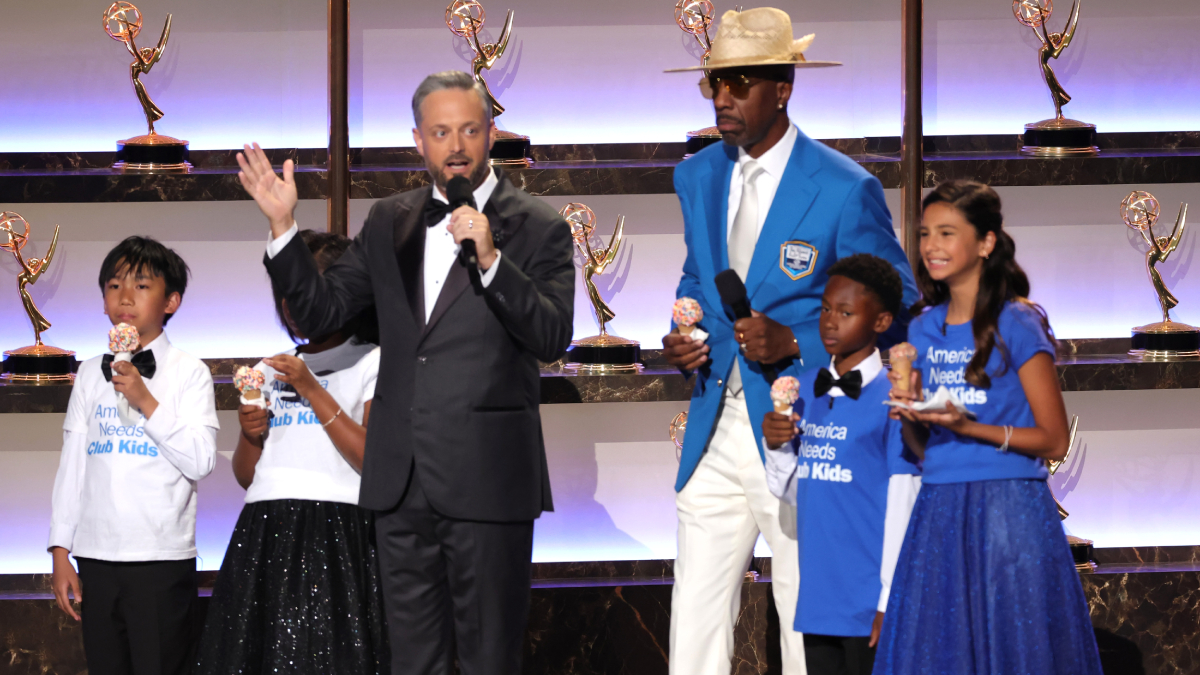
We can expect the Emmys to deliver a few things. Bold fashion choices from its attendees, jokes about the evolution of television amid the streaming era, and at least one show sweeping in categories that nobody could have predicted.
But this year, the 77th Primetime Emmys depended on a running bit that started strong… but ultimately recontextualized the night in a weird way.
Relatively early into the three-hour-long Emmys telecast, host Nate Bargatze introduced a way to keep the acceptance speeches running on time: he would make a $100,000 donation to the Boys and Girls Club of America, and would deduct or add money depending on how long the speeches were. If a speech went longer than the proposed ceiling of a mere 45 seconds, which The Studio‘s Seth Rogen already did while accepting his first of several Emmys of the night before this bit was even announced, then thousands of dollars would be deducted at a rapid rate.
Early on, Bargatze joked that the proposition was both a blessing and a curse, especially when the total dollar amount was coming out of his pocket. But ultimately, the entire bit became both a blessing and a curse. Sure, it was initially met with awkward laughter from the crowd, some of whom were probably delighted by the idea of being spared from rambling acceptance speeches. And the night did help raise some awareness for the Boys and Girls Club, between the occasional cutaway to comedian (and proud Boys and Girls Club alum) J.B. Smoove, and the fact that multiple children from the organization were on hand to help escort winners offstage.
The Emmys, Gamified
But as the telecast (and the speeches) wore on, the donation bit became a needless wrinkle in a night of already-unpredictable television. For one thing, the donation tracker was deployed inconsistently: sometimes it would pop up as a lower-third during a speech, sometimes it would be a giant imposing graphic on the stage, and sometimes it would take multiple segments to be addressed at all. The first few times the graphic popped up onscreen, I found myself involuntarily reacting to the dwindling number, and immediately losing focus on whatever was being said during the actual acceptance speech. This wasn’t just a side effect of me having spent most of my Sunday pre-Emmys watching NFL games: it was because the telecast had gamified the very thing we were tuning in for.
That mentality appeared to bleed over into the room itself, as certain winners began to apologize profusely for going a few seconds over their time, or truncated their speech into a series of broken sentences to try to bring the total dollar amount back up. Hacks star Hannah Einbinder, whose last few sentences of her Best Supporting Actress in a Comedy Series speech were arguably one of the best moments of the night, promised that she’d make her own donation to the Boys and Girls Club to make up for it… which then confused Bargatze’s total even further. By the end of the night, after the number had dwindled well into the negatives, Bargatze announced that the numbers got so wonky that none of it mattered anyway: he would be donating $250,000 to the organization, with CBS tacking on an extra $100,000.
But ultimately, it still did matter to the Emmys themselves. It added a weird, and honestly guilt-inducing, energy to the proceedings, especially when the telecast also included plenty of non-acceptance-speech moments that went long, as is to be the case with any piece of live television. (Jennifer Coolidge’s announcement of the Lead Actress in a Comedy Series winner dragged on for so long, it almost immediately led Bargatze to clarify that only the acceptance speeches would impact the donation total.) The fact that the night included so many first-time winners made it feel awkward too, as their rare opportunity to bask in the success often felt like blips in a charity telethon.
This certainly isn’t the first or last time that major award shows have done a bit like this. Just with the Emmys, Andy Samberg once promised a jet ski to whoever had the shortest speech, and Conan O’Brien once threatened to suffocate Bob Newhart if the telecast went over three hours. But there is a fine line between making a bit work, and adding an awkward ticking clock to one of the biggest TV events of the year. After all, countless winners at the Emmys, Oscars, or otherwise, have just ignored the cues and given the speech they want to, anyway.
(featured image: Kevin Winter/Getty Images)
Have a tip we should know? [email protected]







